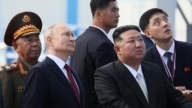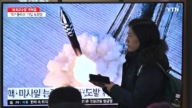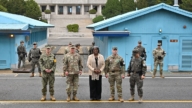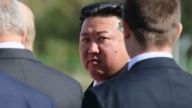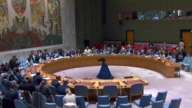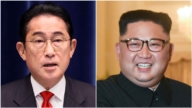【新唐人2013年06月29日讯】正在北京进行访问的韩国总统朴槿惠和中共国家主席习近平,发表了一项联合声明,再次重申朝鲜半岛应实现无核化的立场,双方表示愿意为此共同努力。外界评述认为,在这样的情况下,中共和它所谓的最亲密的盟友——朝鲜之间的关系,变得比以往更加复杂。下面请看详细报导。
6月27号,中共国家主席习近平和韩国总统朴槿惠在北京举行会谈后,发表了一项题为“中韩面向未来”的联合声明。
韩国总统朴槿惠表示:双方在无核化的必要性、继续地区和平、和通过对话解决争端的问题上达成共识。
声明表示:双方一致认为,核武开发,严重威胁了包括朝鲜半岛在内的东北亚及世界和平与稳定。实现朝鲜半岛无核化、保持朝鲜半岛和平与稳定这一目标符合各方共同利益。中韩双方一致同意为实现这一目标共同努力。
中共此举是否表示因核武问题准备抛弃朝鲜,并准备和韩国站在同一立场呢?中国专家对此有不同解读。
旅美政论家伍凡:“北京会不会把朝鲜丢掉呢?不可能。因为北京不希望韩国完全统一朝鲜半岛,但是它也更不希望朝鲜用核武器攻打韩国,用武力统一朝鲜半岛。所以中共现在拉韩国来抵抗北朝鲜的核武器政策。”
朝鲜,是中共一手扶植起来的“小兄弟”,金氏家族50年来始终靠中国的援助来维系自己的权利。只是,近年来,朝鲜这个“小弟”现在把发展核武作为立国之本,不再像原来那样听话,这一举动让中共当局感到恼火。
从2006年以来,朝鲜连续三次核试爆,一次比一次当量大,遭到了联合国包括中国在内的制裁和谴责。国际社会要求北京停止支援朝鲜的声音日益高涨,国内民众也要求停止给“白眼狼喂食”。
香港媒体主持人阮次山对此表示:“我们单方面的对于朝鲜六十几亿美金一年的援助,我们要考虑减半或者完全取消,让朝鲜的金正恩感受到一巴掌的重量跟刺痛。”
毕竟,朝鲜70%的外贸交易是通过中国进行的,而90%的原油,80%的消费品和45%的食品来自中国。韩国《中央日报》指称,过去30年间,中国向朝鲜提供了1000亿美元援助。
中国国内对放弃朝鲜的呼声渐高,但旅美政论家,美国中文杂志《中国事务》总编辑伍凡认为,中共虽然与韩国关系变好,但也会防着韩国,因为韩国背后是美国﹔韩国也会防着朝鲜,因为朝鲜背后又是北京。这导致了“谁也离不开谁”的这么一个三角关系。
对于中共当局来说,一边是不听话的朝鲜,另一边是中国第四大贸易伙伴的韩国。这其间种种错综复杂的关系,也使得中、韩、朝之间的外交关系越来越复杂化。但这种“三角关系”真的会让中共无法逼迫朝鲜放弃核计划吗?
时事评论员文昭:“北京是一个除了双方有经贸上关系之外,在地区安全上,北京是唯一能够了解朝鲜意图的人,也是能够对朝鲜施加影响力和约束力的人。中共对朝鲜有关键性的影响力,甚至是支配性力量的。支配性的力量意味着中共只要愿意的话,它有足够决心的话,它完全有能力逼迫朝鲜放弃核计划。”
时事评论员文昭还指出,朝鲜的有核化也会导致韩国和日本的核武装,这会使东北亚的局势更加紧张,这也不符合中共的利益。但中共掌握着朝鲜经济命脉,对它有决定性的制裁作用。
文昭认为,今年5月底,朝鲜领导人金正恩派特使崔龙海访问北京,并给习近平带去了亲笔信,就是被制裁后的表现。
采访/朱智善 编辑/宋风 后制/李勇
Beijing-Pyongyang – Ties Become Complicated
A joint statement was released after the talks between
S. Korea President Park Geun-hye and Xi Jinping,
President of the Chinese Communist Party (CCP).
The announcement reiterates their nuclear-free stance
towards the Korean Peninsula.
Both sides have expressed their willingness to
work together to this end.
Outside critics interpret that the current situation may
complicate ties between Beijing and Pyongyang.
On June 27, Xi Jinping and Park Geun-hye jointly
released a statement,
“China & South Korea: facing the future”.
Park Geun-hye has said that S. Korea and China have
reached a consensus on the following issues:
the necessity of denuclearization, regional peace,
and the resolving of disputes through dialogue.
The joint statement states that both sides have agreed
that nuclear weapon development has seriously threatened
peace and stability in Northeast Asia and the world.
The goal of denuclearization and maintaining peace
and stability on the Korean peninsula is in the common interests of all parties.
And China and South Korea will, in full accord,
work together to achieve this goal.
Does this mean that the CCP, on the nuclear issue, is now
ready to abandon Pyongyang and join hands with S. Korea?
Experts on China issues give their interpretations.
(Political commentator, USA) Wu Fan:
“Is Beijing going to discard N. Korea? That’s not possible.
Beijing doesn’t actually want to see
a reunification of the Korean Peninsula.
And neither does it expect N. Korea to launch
a nuclear attack on S. Korea.
So now, the CCP actually pulls S. Korea aside, to
resist, together, Pyongyang’s nuclear arms program.”
North Korea has long been known as
the CCP’s “little brother”.
Over the past 50 years, the Kim family has kept
its ruling status with the aid of the CCP.
In recent years, however, the “little brother”
has not followed the CCP’s advice obediently.
It has even prioritized nuclear development,
this has really annoyed the CCP.
Since 2006, Pyongyang has launched three nuclear tests.
The moves encountered heavy criticism from
the international community, as well as sanctions.
Calls on CCP authorities to stop aiding Pyongyang
have risen in the world and in China.
Hong Kong media anchor, Anthony Yuen, has said
that “Each year, we unilaterally offer aid to N. Korea,
worth in excess of 6 billion dollars.
We’d better consider halving it or cancelling it altogether,
so Kim Jong-un may taste the pain of a sharp shock.”
70% of N. Korean foreign trade comes from
transactions with China.
China is also the supplier for N. Korea’s crude oil (90%),
consumer goods (80%), and foodstuffs (45%).
According to S. Korea’s Joong Ang Ilbo newspaper,
Pyongyang has received 100-billion-dollars in aid from China over the past 30 years.
China’s domestic calls for discarding Pyongyang
have been growing.
Critic Wu Fan says that the CCP has warmed up
its relations with S. Korea, but is still wary of this neighbor.
This is because behind S. Korea stands the USA.
Whilst S. Korea is watching out for Pyongyang, too,
as the CCP is the North’s patron.
Wu Fan concludes that these factors have formed
a triangular relationship between these nations.
On one side, CCP authorities are facing
disobedient N. Korea.
On the other side is S. Korea, China’s
fourth largest trading partner.
The complex relationship has complicated
diplomatic ties among the three parties concerned.
Yet, is this “triangle” a real factor that has
disabled the CCP,
in seeking to force Pyongyang to give up its
nuclear arms program?
(Critic) Wen Zhao: “Beijing is the only party that really
understands Pyongyang’s intent, in terms of regional security.
Also, Beijing can exert a key influence over N. Korea
and can even dominate its ruler.
In other words, the CCP authorities are fully capable of
forcing Pyongyang to give up its nuclear program.”
Wen Zhao has noted that N. Korea’s nuclear threat
may force Japan and South Korea to go nuclear.
This will fuel tensions in Northeast Asia,
which is not in the CCP’s interests.
Wen Zhao says that Pyongyang’s economy
is known to be under the CCP’s thumb.
So the CCP has the capability of wielding
decisive influence over N. Korea.
In May, Kim Jong-un sent his special envoy, Cui Longhai,
to Beijing, who conveyed Kim’s personal letter to Xi Jinping.
Wen Zhao says this illustrates Pyongyang’s reaction
to the new round of sanctions.


